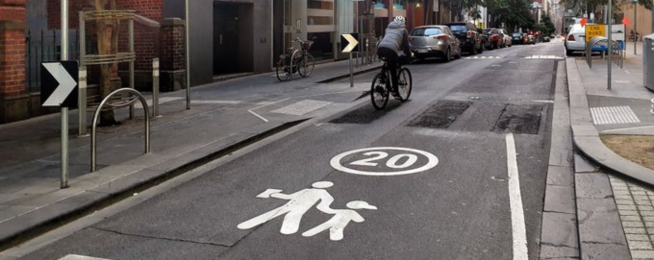The transformation of Melbourne’s ‘Little Streets’ is almost done and dusted, with only a few finishing touches still to come.
Most of the treatments aimed at making the streets more people friendly: traffic calming, speed controls, street furnishings, signage and so on are now ready.
The timing couldn’t be better as the people for whom they were designed—pedestrians and people on bikes—we will be gathering (we all hope) in increasing but appropriate numbers in the coming months.
The streets will be part of a much bigger City of Melbourne push and pull to funnel visitors back to the CBD to enjoy a massively scaled-up outdoor dining and entertainment experience.
For bike riders this new environment will take some adjusting to.
Although motor vehicles will be still be in these little streets, and the logistics vans will be playing their usual important role, they will be playing second fiddle to the people on bikes and on foot.
The streets are now legally ’Shared Zones’. In a shared zone motor vehicles always must give way to pedestrians and bike riders.
And bike riders must give way to pedestrians—just as they currently do on shared paths and trails.
This will require an increased level of alertness by riders because, as we know from experience, a relaxed, strolling pedestrian is likely to change direction randomly at any time.
Because riders will have to give way to all pedestrians who venture on to the road, we will need to travel at a speed that enables us to stop if someone steps into our path.
There will be 20kph speed restrictions on all one way sections of Flinders Lane, Little Collins Street, Little Bourke Street and Little Lonsdale Street.
This will have a major calming impact on these streets as previously cars could travel up to 40kmh.
Motor traffic will also be controlled by speed bumps at intervals along the east-west streets, and the entry points of each street will be further calmed with the installation of planter boxes.
Facilities rolling out across the City
Meanwhile the City of Melbourne is installing more than 500 metres of new bike lanes each week, as preparations ramp up to safely welcome people back to the city as COVID-19 restrictions ease.
Lord Mayor Sally Capp said two kilometres of protected bike lanes have been installed so far, with a further four kilometres under construction. The new lanes are part of the City’s initiative to fast-track 40 kilometres of new bike lanes over two years.
“We’re making it safer to ride from the suburbs to the city by completing the missing links in our bicycle network. The project has created 17 local jobs and we’re using recycled glass to create the bike lane barriers,” the Lord Mayor said.
The Lord Mayor said key bicycle routes have been completed on Albert Street, Drummond Street, Faraday Street, Canning Street, William Street, and on Swanston Street near the University of Melbourne.
"These priority routes will better connect suburbs like Carlton, East Melbourne, North Melbourne, Brunswick and West Melbourne to the central city,” the Lord Mayor said.
“We’ve also improved safety on the southern end of William Street near the Queen Street Bridge. This intersection was known by cyclists as a tricky spot to navigate with no bike lane previously, so we’re proud to make it safer.
“Almost four kilometres of protected lanes are now under construction on Abbotsford Street and Swanston Street between Grattan and Elgin Streets, which will better connect Carlton north to the central city.”
Significant upcoming works will be completed on Rathdowne Street and Exhibition Street, creating a vital north-south link through the city, connecting the inner northern suburbs to the Yarra Main Trail.
Transport portfolio Chair Councillor Nicolas Frances Gilley said spring was the perfect time to embrace riding a bike.
“Our new bike lanes will make it safer for people to ride, which will free up space on trams and trains for people who need to travel into the city from the outer suburbs.”
The project is being delivered in two stages in collaboration with the Victorian Government. The City of Melbourne is investing $16 million to deliver the first 20 kilometres of fast-tracked bike lanes this year.
Become our friend
Find out more about Bicycle Network and support us in making it easier for people to ride bikes.


